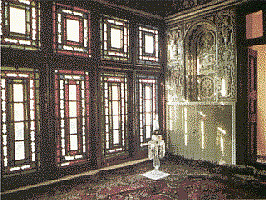 |
Site
of the Bab’s declaration Shiraz, Iran |
Mirza Ali Muhammad, who later assumed the title of Bab (‘gate’), was born 20 October 1819 CE in Shiraz, Persia (now Iran). As a youth he was noted for his charm and great beauty, but also for his exceptional piety, unfailing in his observance of the prayers, fasts and other ordinances of Islam.
When Mirza Ali was 25 he had an experience which led him, on 23 May 1844, to declare to a prominent Mullah that he had been elected by God to be one of his messengers. In those days many Muslims waited expectantly for the appearance of a such a messenger, and he had soon attracted followers, the first eighteen of which—known as “letters of the living”—were sent to different parts of Persia and Turkistan to spread the news of his advent.
Mirza Ali himself set out on a pilgrimage to Mecca, arriving there in December 1844, where he openly declared his mission. When he subsequently returned home his eloquence and zeal as a reformer aroused great enthusiasm among his supporters. However the orthodox Muslim clergy denounced him, and undertook the suppression of the new movement. Persecution increased, with large numbers of his followers imprisoned or put to death. Finally, on 9 July 1850, the Bab himself was publicly executed by the government for heresy.
One
of the early Babis—i.e. followers of the Bab—was Mirza Husayn
‘Ali*, who
became one of the Bab’s most fervent supporters; as a result of
this influence, Baha’is consider the Bab to be the cofounder of
their religion.